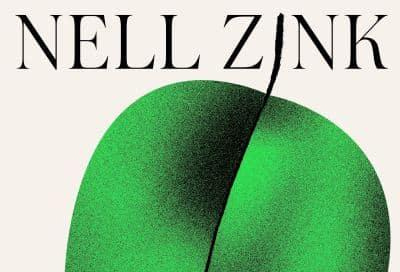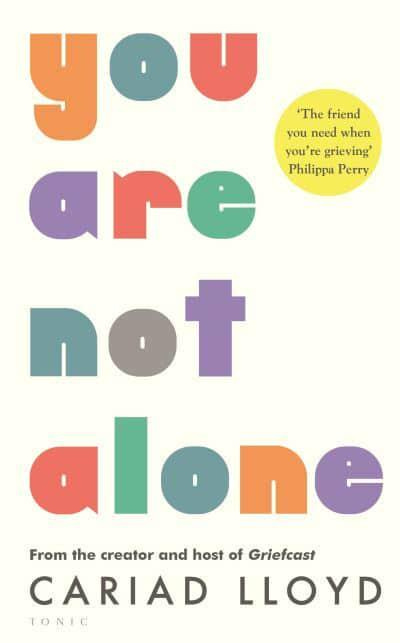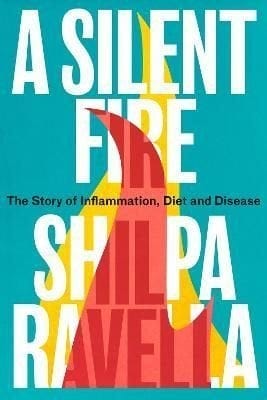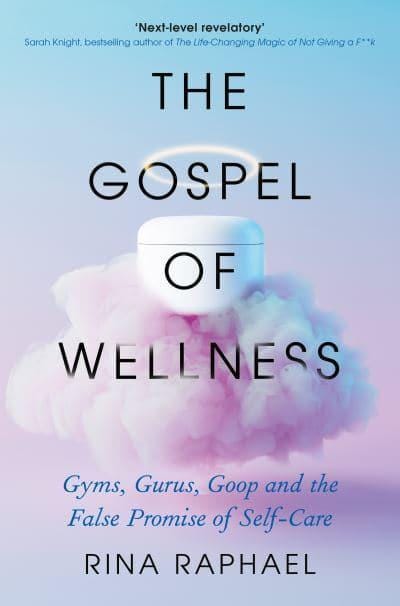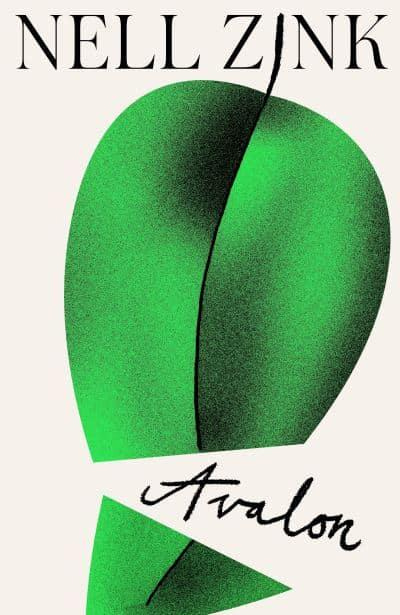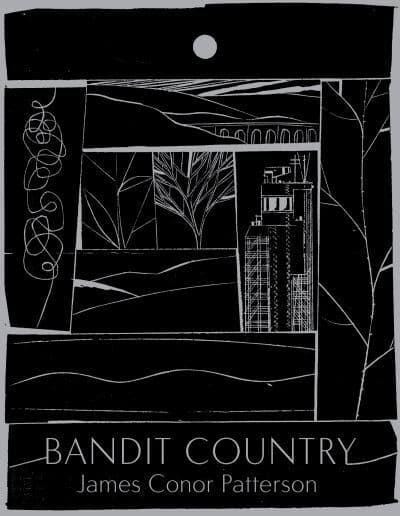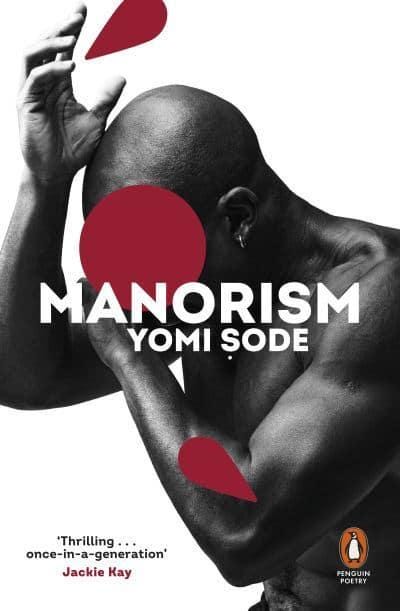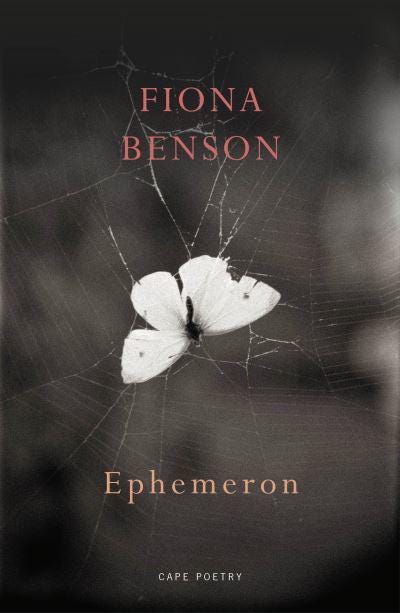Which Books Should You Be Reading This Week?
Your digest of the weekend's newspaper reviews Jan 14/15
Hello, here we are again, it is that time of the week when our attention turns to books, and guess what? It turns out that there are more books than just Prince Harry’s to talk about this week! Thank the Lord!
Firstly though, I hope you enjoyed my chat with Marianne Power this week and that her recommendations for books starting the year as you mean to go on with good intentions, good habits and positive thinking struck a chord. If you missed it, you can watch our chat here, and don’t forget you can buy all of the books in my online bookshop.
So, it seemed a good place to start our digest of the newspaper reviews this week with a review from Marianne herself which appeared in The Times’ Saturday Review section. Marianne was reviewing a book called YOU ARE NOT ALONE by Cariad Lloyd, and it is a book that started life as a podcast called, Griefcast, and that is exactly the subject that it concerns: death and grief.
Now, I have to admit to a vested interest here, not just because our friend Marianne reviewed the book but because I have just been finishing this weekend, a line edit from my brilliant editor at Bloomsbury on a book concerning death that I spent much of last year work on with Wendy Mitchell who I ghost. It’s a tricky one, spending so much time in the company of death, but our own thesis at the start of the book is that we don’t talk about it enough, and perhaps Lloyd’s book is a case in point, that’s why we also don’t know how to deal with grief.
Marianne starts her review in The Times remembering her own grief after her dear dad’s departure a few years ago, and she encapsulates that time as ‘unpredictable, funny and sad, and YOU ARE NOT ALONE captures this beautifully…. it is a blackly funny, honest, thought-provoking and compassionate book that will be a comfort to all who know loss’
And, let’s face it, sadly, that’s 100% of us, unless you are a hermit, but that would also probably make you… a writer, which means you’d still be interested in this book.
Lloyd is an actress and comedian, who lost her own dad when she was just 15. Griefcast has talked to a whole load of famous people about their own experiences of death and she details in this book what she has learnt along the way:
‘She worried [when her dad died] that she was doing grief wrong and felt guilty and ashamed that she was not skipping her way through the usual stages: anger, denial, bargaining and depression, then arriving neatly at acceptance, ideally within one year of the loss,’ writes Marianne.
So it will come as little surprise to you that LLoyd is scathing about the standard five stages of grief and it turns out – no surprises here – that we might just have the Victorians to blame for imposing this timeline on us. They ‘sought to control grief with rules and regulations,’ Lloyd writes in the book.
Those Victorians, so very controlling, don’t we wish we could just go back in time and shake them up a bit?
Marianne tells us in her review that Lloyd writes about how some people can thrive after loss. ‘One study found that 67 per cent of British Prime Ministers who served from the start of the 19th centure to the start of the Second World War had lost a parent before the age of 16.’
Personally, from my own experience of losing a parent at a fairly young age, I can only say that it builds resilience, and instills in you a sense that you can control nothing in this life (those Victorians were wrong!) and so, you’re better off just enjoying each day as you find it.
If you would like to know more about life after death, you can buy YOU ARE NOT ALONE here.
Moving onto our second book, another subject that piqued my interest as my second book with Wendy Mitchell, WHAT I WISH PEOPLE KNEW ABOUT DEMENTIA is out in paperback in a few weeks, if you can’t wait I have copies ‘in store’ of the hardback here. When it was published in hardback it was an instant Sunday Times Bestseller (like our first, SOMEBODY I USED TO KNOW) and it really is a bible for anyone who is affected by dementia, or would like to know more. But the next book on our list today concerns what might be the cause of diseases like dementia, and that, according to it’s author Shilpa Ravella is inflammation.
A SILENT FIRE is Ravella’s exploration into what causes inflammation in the body (plot spoiler: diet and stress) and most importantly, how to avoid and therefore, perhaps, a myriad of these types of chronic and progressive diseases, cancer included.
‘Ravella explains, scientist now believe our modern world contains myriad new triggers. Processed food, cigarette smoke, a sendentary lifestyle, too much read meat, insufficient sleep – all have been found to set off long-term, low-grade ‘hidden’ inflammation.’
And avoiding that inflammation is the key to living longer, and healthier, the author of A SILENT FIRE believes.
‘What to do? Brushing your teeth and getting a flu jab aren’t bad places to start,’ writes Rhys Blakely, reviewing for The Times. ‘The author also makes a compelling case for watching what you eat. It’s nothing you won’t have heard before: consume mostly plants and not too much, avoid processed junk and saturated fats, eat whole food, consider fasting. But Ravella also explains in detail how researchers came to these conclusions… Ravella then delves into the science describing how saturated fat decreases microbial diversity in your gut and breeds inflammatory bacteria, and how eating broccoli does roughly the opposite. There’s lots of detail, but the history lessons help the scientific principles to stick in the mind. And if your new year’s resolution involves a promise to take care of yourself, this book might just help it stick too.’
A persuasive case to buy this book if ever I heard one. You can purchase A SILENT FIRE here.
Moving on from doom and gloom (!), yet sticking to the theme of wellness, The Independent had a feature in its lifestyle section about a new book called THE GOSPEL OF WELLNESS: GYMS, GURUS, GOOP AND THE FALSE PROMISE OF SELF CARE by Rina Raphael.
‘The entire concept of wellness is founded on the idea that just because you aren’t sick, it doesn’t mean you’re not unwell,’ writes Eloise Hendy taking a deep dive into the contents of the book.
Wellness, she insists, is everywhere, and she might have a point, but you only have to follow the money to find out why, the industry was valued at an eye-watering $4.4 trillion in 2020, and now it makes sense why so many women in their mid-forties are retraining as yoga teachers – wouldn’t you want a slice of that pie? It’s big enough, let’s face it.
Hendy tells us that Rina Raphael was a ‘wellness acolyte’ and the author admits that’s because it was so mainstream, so unavoidable, but she admits in her book that instead her love of wellness was, in fact, making her… well, unwell.
‘She felt like punishing herself if she missed a single day of working out. She became terrified of parabens, or the preservatives found in many cosmetic products.’ But then, through her work as a journalist, she discovered that the wellness industry might not be all that it seemed.
‘I was hearing from scientists and researchers who informed me that a lot of these companies were completely pseudoscientific… I had to realise that the wellness industry wasn’t well.’
And that scepticism led her to write THE GOSPEL OF WELLNESS.
Raphael takes a good look into each of the separate churches of wellness, from gyms to beauty products and everything in between and what she discovers is that if you convince widespread sections of the population that they are unhealthy, and add to that a wealthy demographic of people with a disposable income, mixed them in a blender with (presumably) coconut water, cucumber, ginger and the like, you get a lucrative industry that ironically makes itself fatter in your pursuit to be thinner/glossier/happier.
‘This means… that in the constant pursuit of ever-larger profits, the wellness industry will keep inventing new-fangled reasons for their marks to feel dissatisfied,’ writes Hendy.
THE GOSPEL OF WELLNESS sounds like it would make a great Netflix series. It also sounds like a book to buy to quit giving yourself a hard time that you’re not healthy enough. Throw away your wheatgrass shot and buy this instead, and you can do that here.
Fiction now and Nell Zink has a new book out. AVALON received solid reviews in almost all the newspapers this weekend. The Observer’s New Review summed it up thus: ‘AVALON is about another misfit: Bran, a ‘twenty-frist-century teenager’ in her own words, growing up on an exotic plant nursery in south-western California. Her mother abandoned Bran when she was 10 and became a nun in a Buddhist monastery somewhere in the Sierras. The nursery is managed by Bran’s ‘common-law stepfather’ and his family, the Hendersons, and they run a more or less Dickensian ship. Bran is allowed to stay because ‘she represented circa eight years of unpaid labour and a potential twenty thousand dollers in earned income tax credits, if the IRS played along’. Bran ends up spending most evenings trimming topiaties at the nursery or preparing an order of ferns for delivery, instead of hanging out with her only friend from school, Jay.’
So far, so David Copperfield, I was getting a flashback to writing about Barbara Kingsolver’s latest DEMON COPPERHEAD for you. The Observer’s review continues:
‘The novel pivots into an effervescent meet-cute once Bran is introduced to Peter, a friend of Jay’s from college. Peter is one of those erudite mansplainers… he is also a master of negging…. This, of course, has the effect of making him seem even more intriguing to Bran: ‘I could feel that I was being fucked with and liked it a lot.’’
Ok, perhaps we take a handbrake turn away from Dickens here, I don’t think he would know what negging is, I’m only slightly sure I do. But The Observer hails this as Zink’s most ‘sincere’ novel and claims that the ‘will they/won’t they’ element of the relationship between Bran and Peter keeps you turning the page.
If you like Jonathan Franzen, you might just find something in Nell Zink you like too, one interesting fact about her is that she wrote to Franzen as a fan and he took her under his wing and here she is on novel number three, so he did a pretty good job as her mentor. If this has piqued your curiosity, you can buy AVALON here.
Poetry now, and tonight 2,000 people will converge on the Royal Festival Hall to hear from the ten authors in the running for the £25,000 TS Eliot Prize, the UK’s richest award for written verse. I was amazed when I opened my little pop-up bookshop how poetry was one of the first books to sell out, you can still buy BLUE HORSES, THE PEACE OF WILD THINGS and GREAT GODDESSES btw), and so I thought you might like to see which volumes are in the running for the prize.
‘Different voices – not just styles, but voices; cadences, accents, dialects – define this year’s shortlisted books,’ Tristram Fane Saunders wrote in The Telegraph on Saturday, ‘They take familiar forms and fill them with words from Nigeria and Northern Ireland, London estates and Trinidad.’
And here’s what he had to say about each of them:
‘James Conor Patterson’s debut BANDIT COUNTRY is peppered with what Patterson calls ‘a dirty mélange of English, Irish, Ulter Scots and Shelta.’
In SONNETS FOR ALBERT Anthony Joseph’s father Albert ‘leaps from every page: frustrating, unknowable, funny and larger-than-life.’
Yomi Sode’s debut MANORISM features symbolism that ‘begins with a prayer in Yoruba and takes us to a chicken-shop in Peckham.’
Family and sickness are themes in Denise Saul’s collection THE ROOM BETWEEN US and Fane Saunder’s writes: ‘A numbed blankess is what gives these poems their poignancy.’
‘Every spare word has been stripped from Mark Pajak’s SLIDE. His lines are whittled down smooth, heavy on monosyllables.’
Fane Saunder’s states that Pajak’s is the most polished debut, but it is newcomer Victoria Adukwei Bulley and her collection QUIET who is the poet he is ‘keenest to see more from… She can do keen-eyed contempory observation… and oblique myth-allegory…Odes to a snail and a mosquito made me laugh.’
Philip Gross’s 27th collection THE THIRTEENTH ANGEL ‘muses on shadows and light, reflections and absences.’
Jemma Borg writes ‘with a painter’s eye’ in her collection WILDER.
Fiona Benson’s third collection EPHEMERON is ‘a split between nature, motherhood and Greek myth… few poets write on these themes so brilliantly,’ Fane Saunders asserts stating it as his favourite out the lot.
But he claims the most likely winner is Zaffar Kunial’s ENGLAND’S GREEN. ‘If you’ve drifted away from contemporary poetry, this book might win you back round.’
So let’s see if he’s right.
That’s it from me for this weekend. I hope you’ve enjoyed this walk through the newspapers’ review sections. Do let me know!
• Remember that you can still support The Book Room by buying online while I look for a new place to pop up, and you can send me custom orders here and I’ll aim to get your books to you within 24-48 hours.

